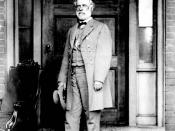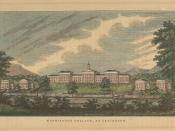This book was written by Marshall W. Fishwick. His home just happens to be on the Washington and Lee University campus, which is located in Lexington, Virginia. He was a natural born Virginian, just like Lee. He wrote this book, not on the story of Lee, but the very deep meaning of Lee.
On January 19, 1865, Lee's fifty-eighth birthday, General Lee was made Commander in Chief of the Armies of the Confederate. This move was made too late by the south, because on that same day Sherman left Savannah and was advancing towards North Carolina. This was the beginning of the end for the confederacy. Meanwhile back in the north on January 31, the thirteenth amendment was passed, which abolished slavery. Between these two factors, it proved to be too much for the south. By April the confederacy sank into the shadows and the dusk. Over 3,200 confederate prisoners had been taken by this time.
On April ninth Lee surrendered his army to Ulysses S. Grant, with any outward show of emotion. The surrendering of the confederate army came to be known as Appomattox. Grant added one last small touch of respect, providing the right coda for Appomattox. As Lee rode away, Grant stepped down from the porch he was standing on, took off his hat and stood in silence. So did the rest of his down-ridden staff. There is no single greater act of military tribute in American history.
By that point in time, all seemed lost, but Lee didn't look for a scapegoat. Lee said, " It was all my fault. I thought my men were invincible."ÃÂ This was among the many admirable traits of Lee exhibited throughout his life and this book. It was now time for soldiers to go home, and mothers to cry. On...


